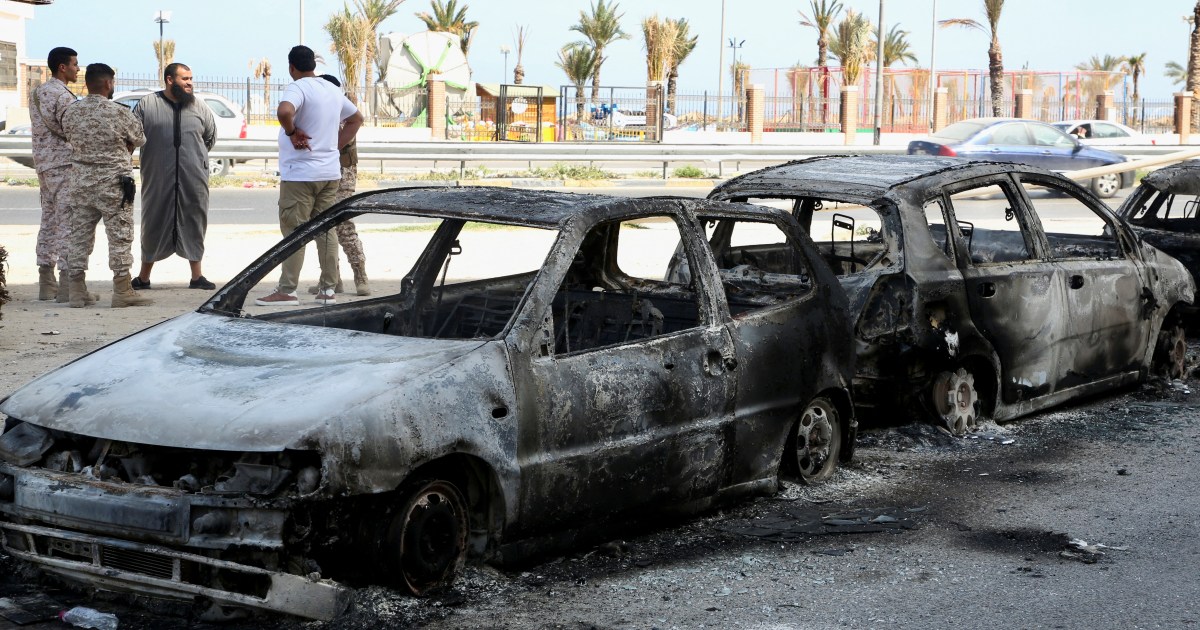4 people were killed, including a civilian, and 3 others were wounded, yesterday evening, Wednesday, in clashes with light weapons in the densely populated Dahmani area, in the center of the Libyan capital, Tripoli.
Clashes erupted between two armed groups, one of which is affiliated with the Government of National Unity, the Special Deterrence Force, and the other from the Stabilization Support Organization of the Presidential Council.
In addition to the dead, the clashes - whose cause is unknown - resulted in the destruction of a vehicle for the Presidential Council.
Activists posted on Facebook videos of the clashes.
The Tajoura region is also witnessing tension between the forces of the Presidential Council and brigades from the region, against the background of the release of a wanted man by the Tajoura Brigades.
In mid-May, Tripoli witnessed clashes between forces affiliated with the National Unity Government headed by Abdel Hamid Dabaiba, and others loyal to Fathi Pashaga, the Prime Minister-designate from the House of Representatives, after the latter entered the capital in an attempt to seize power.
international invitation
In New York, Farhan Haq, Deputy Spokesman for the Secretary-General of the United Nations, urged Libyan leaders to refrain from using the end date of the transitional phase specified in the road map as a tool to manipulate the map's overall goal, which is to hold elections.
Haq said that the date of June 22 (yesterday) was set as the date for the end of the road map, provided that presidential and parliamentary elections are held before this date, which did not happen.
He added that the United Nations remains firmly convinced that elections are the only way to renew the legitimacy of all institutions in Libya.
For his part, Parliament Speaker Aguila Saleh, as well as Bashagha, believe that the legitimacy of the unity government has expired, but Dabaiba has repeatedly stressed that he will hand over power only to a government that emerged from elections.
And Bashagha called - on Tuesday - to stop dealing with the unity government as expired, and pledged to hold elections as soon as possible.
National Reconciliation
On the other hand, the Presidential Council will officially launch today the strategic vision of the National Reconciliation Project, with the aim of addressing all issues, ending the transitional stages and achieving stability in the country, according to a statement by the Presidential Council.
The statement also indicated that the Presidential Council will hold a press conference in Tripoli on the sidelines of the project launch ceremony to explain the details of the work strategy of the High Reconciliation Commission.
The vision includes preparing a formula for integrating and amending transitional justice laws, to begin expanding the circle of elite and societal participation to contribute to the establishment of a stable state.
The roadmap for the preliminary phase of a comprehensive solution signed in Geneva stipulates that one of the functions of the Presidential Council is to launch the path of national reconciliation and the formation of a High National Reconciliation Commission.
Meshri and Saleh
On the other hand, the United Nations announced, today, Thursday, the approval of the Speakers of the House of Representatives, Aguila Saleh, and the Supreme Council of State, Khaled Al-Mashri, in Libya, to hold a meeting in Geneva in late June, to discuss the draft constitutional framework for the elections.
In a tweet on Twitter, the UN Special Adviser to Libya, Stephanie Williams, wrote, "I am pleased to confirm that the Speaker of the House of Representatives and the President of the High Council of State have accepted my invitation to meet at the United Nations Headquarters in Geneva from 28-29 June."
Williams explained that the meeting will be to discuss the draft constitutional framework on the elections.

